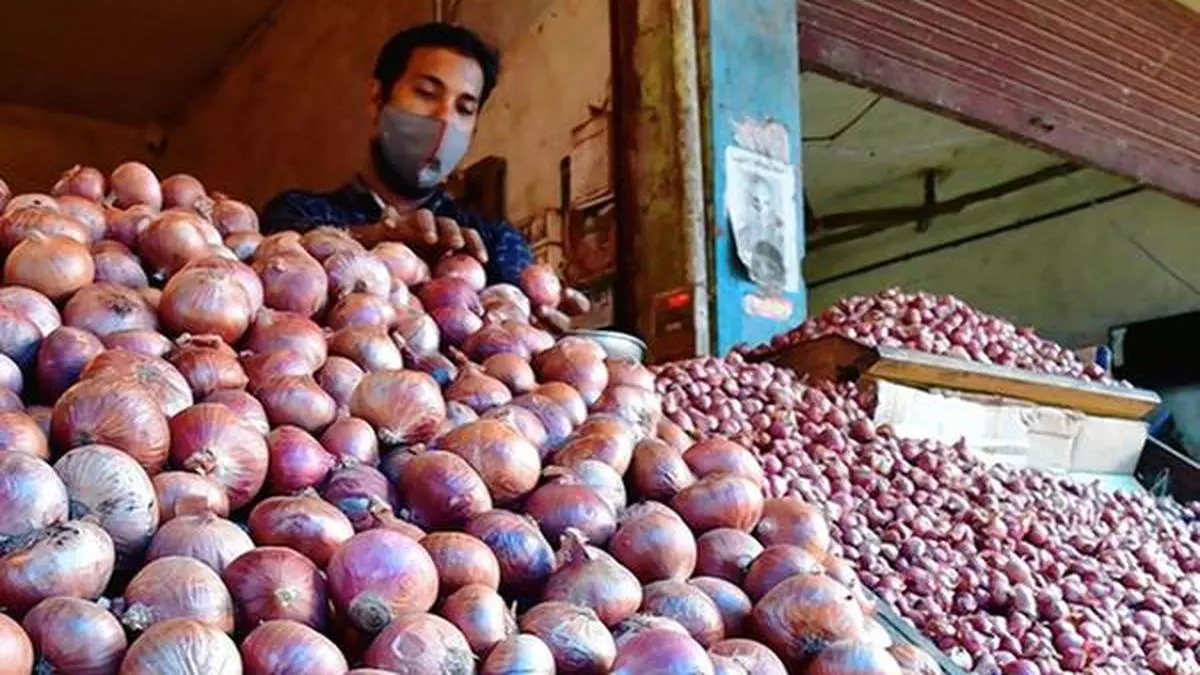Lack of govt control on retail outlets blamed for soaring onion prices
With onion prices selling at around ₹100 a kg in some parts of the country, the lack of government control on retail outlets is being blamed for the soaring rates. However, prices of the kitchen staple are expected to drop sharply in a fortnight as kharif arrivals have begun.
“There is always a problem with retailers as there is no control over them. The Government controls only wholesale trade. Taking advantage of this, retailers hike prices,” said Ajith Shah, President, Horticulture Produce Exporters Association (HPEA).
“The Government has no control over the retail trade. Also, agents monopolise the trade since there is lack of storage facilities in many cities,” said Parashram Patil, senior advisor-agriculture, Maharashtra Institution for Transformation and a board member of Apeda.
Rabi produce
Compared to the retail outlets, the modal price (the rate at which most trades take place) of onions at the agricultural produce marketing committee (APMC) yards, particularly in Lasalgoan in Maharashtra’s Nashik district, on Tuesday was ₹5,851 a quintal for fair average quality. This is rabi onion harvested in April-May with a longer shelf-life. Kharif or red onion is quoted at ₹3,600 a quintal at Lasalgoan. Also, prices of superior-quality onions have begun to decline.
Onion prices in the national capital region (NCR) have increased to ₹70-75/kg from ₹50-60 a week ago. On the other hand, the Centre has been selling onions at ₹35/kg directly to consumers through co-operatives such as Nafed, NCCF and Kendriya Bhandar, besides some other agencies like Safal stores of Mother Dairy.
“It takes 48 hours for onion to reach Chennai from Nashik. However, what is currently sold in the city would have been bought last week,” said M Madan Prakash, President, Agricultural Commodities Exporters Association (ACEA).
Shah said it takes an additional ₹10/kg for onion to reach any part of the country. “For example, onion might cost ₹50/kg including transportation and other costs if it is purchased at ₹40 in Nashik. It will be reasonable for the trade to add ₹10 per kg. But retailers are charging more,” he said.
Lack of info arbitrage
Onions currently sold in many cities were harvested in the rabi season as the arrival of kharif onions has just started. “Prices have soared since arrivals of kharif onions have been delayed due to rains last month in Maharashtra’s growing areas,” said Shah.
“There are two reasons for this behaviour at retail outlets. One is retailers add volatility premium. Two, there is arbitrage due to non-availability of exact information,” said V Shunmugam, an expert in market research and financial markets.
The onion trade is not organised but is behaving like an organised one by charging heavy premium in the name of perishability. “Retail traders do not have any representatives in places such as Nashik. We don’t know how onion gets transacted after getting sold at APMC yards. There is a lack of transparency at each level after sales at the agri-market terminals,” said Shunmugam.
Patil said the lack of storage facilities in cities such as Chennai means retailers in the metropolitan city are at the mercy of agents, who dictate the terms.
NCR’s woes
“Retailers take advantage whenever there are reports of damage to crops. Without verifying these, prices are increased. This time, they have take advantage of a delay in the arrival of the kharif crop,” said a trader, who did not wish to be identified.
In some places of NCR, consumers said though prices are cheaper, the availability and quality of government-supplied onions need to be addressed.
“Once or twice I tried at a Mother Dairy booth and could not get it as there was no onion. I never tried again and had to depend on the market,” said Kanti Devi, a resident in Noida sector 134, which falls under NCR. She said some vendors, who are sourcing government-supplied onions, are selling ₹5-10/kg cheaper than market rates, though quality is not that good. On November 9, the best quality onion in Noida’s wholesale vegetable and fruits market (mandi) was sold at ₹300 per 5 kg.
Though the Centre brought over 2,400 tonnes of onions by train till October 30, no further consignments arrived as of November 10. This is also partly responsible for the flare-up in prices.
Rising kharif arrivals
“We expect prices to begin declining in another two weeks. The crop is good,” said HCEA’s Shah.
ACEA’s Prakash said 20-30 tractor loads of kharif onions arrived in Nashik on Tuesday and more are expected next week. “The quality of onions this year is very good in colour and finish,” he said.
“The kharif onion will hit the markets in 15 days. The crop is good in all aspects due to the beneficial monsoon,” Lasalgaon APMC Chairperson Suvarna Jagtap said.
According to the Crop Watch Weather Group of the Ministry of Agriculture, kharif onion sowing has met the 3.82 lakh hectares target. This is higher than last year’s acreage of 2.85 lakh hectares.
